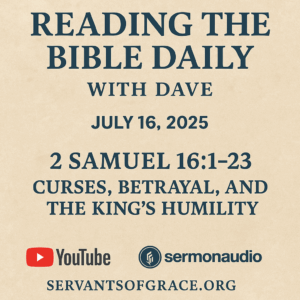⏱️ Estimated Reading Time: 6 min read
In Dave Jenkins’ book, The Word Explored, he cites several alarming statistics[i] as it relates to biblical literacy amongst Christians:
- Fewer than half of all adults can name the four Gospel accounts.
- Many Christians cannot identify two or three of the disciples.
- Sixty percent (60%) of Americans cannot name five of the Ten Commandments.
- Eighty-two percent (82%) of Americans believe that “God helps those who help themselves” is a Bible verse.
- Even among “born again Christians”, eighty-one percent (81%) believe that the Bible teaches the primary purpose in life is to take care of one’s family.
- Twelve percent (12%) of adults believe that Joan of Arc was Noah’s wife.
- Over fifty percent (50%) of graduating high school seniors thought that Sodom and Gomorrah were husband and wife.
As a pastor, I can sadly confirm the reality of biblical illiteracy amongst professing Christians, and my church is not unique. I would venture to say that biblical illiteracy amongst Christians isn’t primarily a matter of education (though that is important)—it’s deeper than that. Biblical illiteracy is a heart issue. The late R.C. Sproul once published a book called, Everyone’s a Theologian, and in it he asserts that no matter what we know, we are asserting what we believe (or do not believe!) about God and His Word. Given the statistics of biblical literacy amongst Christians, what is demonstrated even more than our lack of knowledge is our lack of interest—which is to say that we are more interested in temporal, fleeting pleasures than knowing the God we claim to love and cherish. Therefore, our theological positions are typically navigated by our apathy and emotion. Instead of informed minds and warm affections for Christ, we have ambivalence and unbridled passion. What we believe in our bones deeply influences how we behave. Therefore, biblical illiteracy is a problem. But what is a way out of this?
A Path Out of Biblical Illiteracy
Now there are several different means God has provided to remedy biblical illiteracy (and Dave Jenkins does a fantastic job at covering some in his book, The Word Explored); but allow me to suggest one specific approach in this short article: biblical counseling. Pastors should be committed to counseling the members of the Body that God has entrusted to them in their local church. Pastors that disengage from this aspect of pastoral ministry are missing out on a great opportunity and felt need in their local church. There are sermons and specific topics I’ve preached about from the pulpit many times, that in God’s providence, a brother or sister in Christ needed applied to them in the private ministry of the Word (biblical counseling). There have been times that I’ve been able to help a person, by God’s grace, to do the very thing God commands us to do in the book of James when he says:
“21 Therefore lay aside all filthiness and overflow of wickedness, and receive with meekness the implanted word, which is able to save your souls.22 But be doers of the word, and not hearers only, deceiving yourselves.” (James 1:21-22 NKJV).
The ministry of biblical counseling (or discipleship) allows a pastor to bring God’s Word to bear on individuals wrestling with various sins and sufferings on an individual basis.
Many Christians confess (as they should) the inspiration, infallibility, and inerrancy of Scripture, but fewer Christians see how the God-breathed Word is sufficient. Professing Christians who are not interested in knowing the Word are professing Christians that do not know how to apply God’s Word. Now, I say professing because I am skeptical of any “professing Christian” that is not interested in growing in the likeness of Jesus Christ. For many in the visible Church, the problem is that they need their hearts regenerated by the Holy Spirit of God. They need to repent of their sin and trust in Christ as the sufficient Savior that He is. As Jay Adams would say, evangelism is pre-counseling.
But if we have believers in our congregation that are biblically illiterate and no doers of the Word, biblical counseling is a fantastic way to confront that issue. Biblical counseling certainly increases one’s knowledge of the Bible, but when done properly, it puts a person in a position to submit their thinking and behavior to the revealed will of God—to become, as James says, a doer of the Word.
So, for pastors unfamiliar with biblical counseling, where can you begin? In recent years there have been numerous books published on the ministry of biblical counseling, but I’ll recommend a few. The first is Heath Lambert’s book, A Theology of Biblical Counseling. When I’ve taught biblical counseling courses, this is the book I assign to be read. In it, Lambert does an excellent job at demonstrating the theology that undergirds the ministry of biblical counseling. Secondly, I’d encourage you to read Stuart Scott’s and Heath Lambert’s book, Counseling the Hard Cases. This book demonstrates the sufficiency of God’s Word when rightly administered in the counseling context.
And as you personally approach this particular ministry, I would encourage you to do so in a particular way. First, savor Christ in all His glory and splendor. The Lord that you speak of from the pulpit and counsel in the private ministry of the Word, should be your personal, lasting joy.
Second, be the chief repenter in your church. Pastors effectively lead when they demonstrate a habit of repentance. Be quick to confess your sin and to turn from it and to Jesus.
Third, remember that the Word of God really is sufficient. The Accuser, and our culture, says the contrary, but stay near the Word. Use biblical words to describe sins and sufferers, bring the gospel to bear on each particular situation you encounter.
Fourth, when you face trials of various kinds, strive to do so with humility, and an open-handedness before the Lord. Believe it or not, your congregation is watching. As you endure trials with gospel-centered optimism, you are being a doer or the word and not just… if I may… a preacher of the word.
Fifth, strive with the sinner/sufferer in patience, love, and truthfulness as you open the Word, speak of the Word, and help the image bearer apply the Word to his or her life.
Sixth—and perhaps foundationally—pray. Pray without ceasing. Declare your dependance on the Lord. Pray for those the Lord has entrusted to you. Pray for understanding, discernment, ears to hear, eyes to see, and ultimately that the Lord would be glorified, and your counselee conformed more into the image of Jesus.
The ministry of biblical counseling is a ministry that I believe can confront biblical illiteracy and do so in a warm, pastoral, gospel-centered way. Pastors, please counsel your people.
References:
[i] The State of the Bible Six Trends for 2014, 8 April, 2014, accessed July 5, 2019. http://www.barna.com/research/the-state-of-the-bible-6-trends-for- 2014/#.VkZeQr9xJpu quoted in Dave Jenkins, The Word Explored, (Peterborough: H&E Publishing, 2021).



